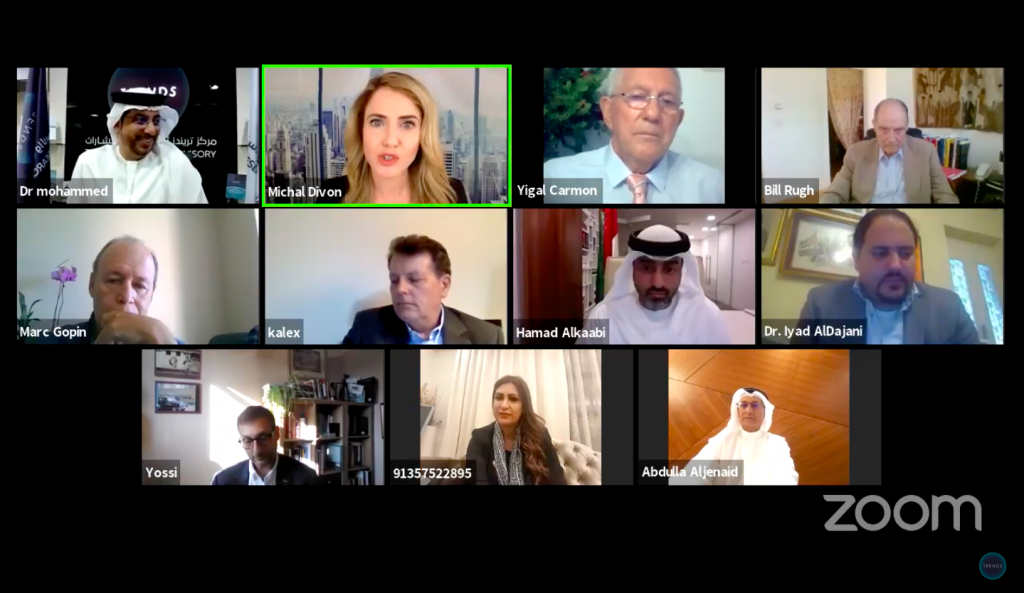
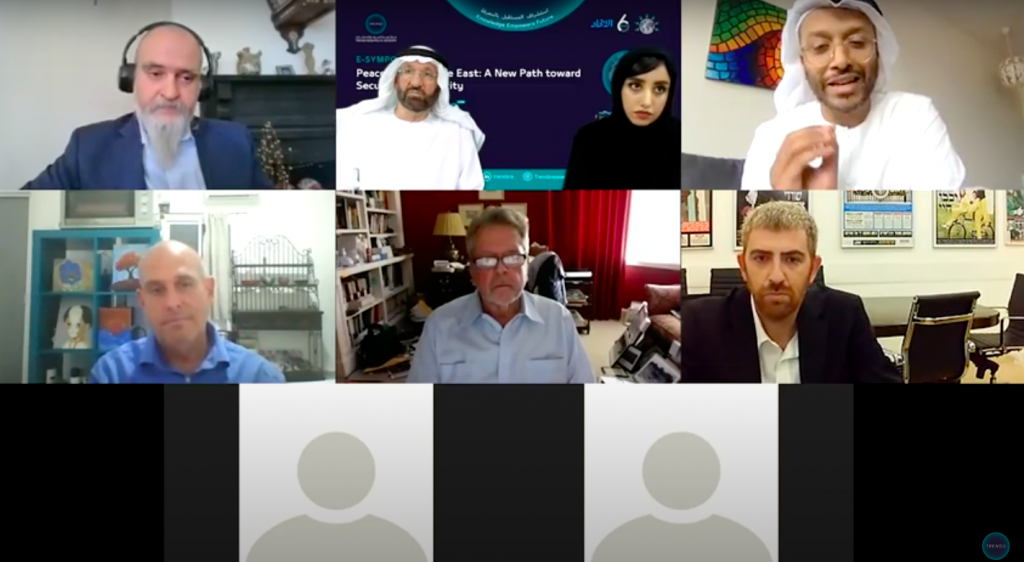


Carla Chahrour
The prospects for peace in the Middle East following the United Arab Emirates and Bahrain’s decisions to normalise relations with Israel, the new Arab, Israeli and American-European perspectives for the establishment of long-term peace, the role of the Media in Building a culture of peace and the opportunities for cooperation in building comprehensive peace and security in the region were the main topics of discussion on Monday during an E-Symposium entitled “Peace in the Middle East: Forging a New Path to Security and Prosperity” organized by TRENDS Research & Advisory in collaboration with Al-Ittihad and Yedioth Ahronoth newspapers.
The symposium was comprised of two sessions. The first session titled “World Peace Day: An Opportunity to Overcome the Legacy of Conflict” discussed the importance of peace as a key to stability, development, and prosperity and highlight renewed hope for peace and stability stability in light of the new developments in the Middle East. While the second session, which was titled “Arab-Israeli Peace Agreements: New Vision for a Lasting Peace in the Middle East” highlighted the new vision for building peace in the region by focusing on the new Arab perspective, the Israeli and the US-European perspective.
The event brought 14 prominent experts from around the world, including Dr. Marc Gopin, the Director of the Center for World Religions, Diplomacy and Conflict Resolution at George Mason University, USA; Ambassador William Rugh, the Edward R. Murrow Visiting Professor of Public Diplomacy at Tufts University’s Fletcher School of Law and Diplomac; Abdulla Al-Junaid, a Bahraini writer specialized in political affairs; Ahdeya Ahmed, the Chairman of the Board of Directors Bahraini Journalists Association; Dr. Phil Iyad Al-Dajani, a fellow Researcher at the Jena Center for reconciliation studies, International Coordinator for the Middle East and North Africa; Yigal Carmon, the President and Founder Middle East Media Research Institute, Professor Yossi Mekelberg, a Senior Consulting Research Fellow of the MENA Program at Chatham House, and a Professor of International Relations at Regent’s University, as part of the session.
The second session included Ghaith Al-Omari, a non-resident fellow at the American Task Force on Palestine; Dr. Geoffrey Kemp, a Senior Director of Regional Security Programs at the Center for the National Interest; Corey Gil-Shuster, a Director at International Program in Conflict Resolution and Mediation at Tel Aviv University; Omar Al-Busaidy, an Author and International Affairs Analyst and Dr. Pascal Boniface, the founding Director of the French Institute for International and Strategic Affairs based in Paris.
Among the keynote speakers was the Editor-in-chief of Al-Ittihad newspaper, Hamad Al-Kaabi and Dr. Mohammad Al-Ali, the Director General of TRENDS Research & Advisory and an Emirati researcher/author, specializing in strategic and political affairs.
The event was moderated by Michal Divon, an Israeli-American journalist and TV host living in NYC along with Ahmed Al Hosani, a UAE Ambassador.
While Moderating the first session of the symposium, Divon highlighted the significance of the event’s occurrence coinciding with the International Day of Peace, which is celebrated worldwide on September 21 and emphasized the opportunities brought forward by the UAE-Israel normalization agreement, known as the Abraham Accord.
“The bravery found in true leadership has granted us, the people, the gift of a lifetime. You gave us not only peace, but a true long-lasting friendship,” Divon said.
The Director of the Center for World Religions, Diplomacy and Conflict Resolution at George Mason University, US, Dr. Marc Gopin, spoke about his visit to Abu Dhabi and praised the country for the messages of tolerance spread throughout the streets, saying “I was deeply impressed by the intentionality of the style and substance of modernization that was focused on tolerance and I think we can build on that in terms of international relationships.”
He then discussed the neurological effects of compassion and how this trait can help people learn to live comfortably as neighbors, which can then allow them to rationally deal with their differences and common challenges.
“War undermines all of the abilities of compassion and reasoning to figure out the most practical outcome that will lead to prosperity for all,” Gopin said.
Dr. Kristian Alexander, a Researcher at TRENDS Research & Advisory and an adviser at Gulf State Analytics, a Washington-based geopolitical risk consultancy, outlines the different conceptualizations of peace and discussed how Abraham Accord should be looked at not only as an establishment of diplomatic ties with Israel, but as a wider comprehensive strategic agreement that signifies “a new discourse of change” for the Middle East.
“The avoidance of misperception of one another through intercultural understanding and sustainable dialogue is key to peace and prosperity,” Alexander said.
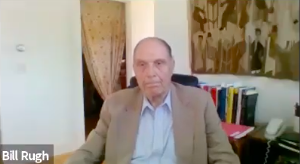
Ambassador William Rugh, the Edward R. Murrow Visiting Professor of Public Diplomacy at Tufts University’s Fletcher School of Law and Diplomacy expanded on the initial accord’s impact, saying “the UAE-Israel agreement has as suspended the Israeli threat to annex the West Bank, which is a good thing because annexation would be very bad for thePalestinians.”
In an educational presentation, Dr. phil Iyad Al-Dajani, Fellow Researcher at the Jena Center for reconciliation studies, International Coordinator for the Middle East and North Africa, elucidated the meaning of reconciliation, which he described as the “restoration of the relationship between individuals, groups, states after the violence of war.” He also elucidated the different mechanisms of reconciliation, the strategies for it and its role when conflict resides in the middle.
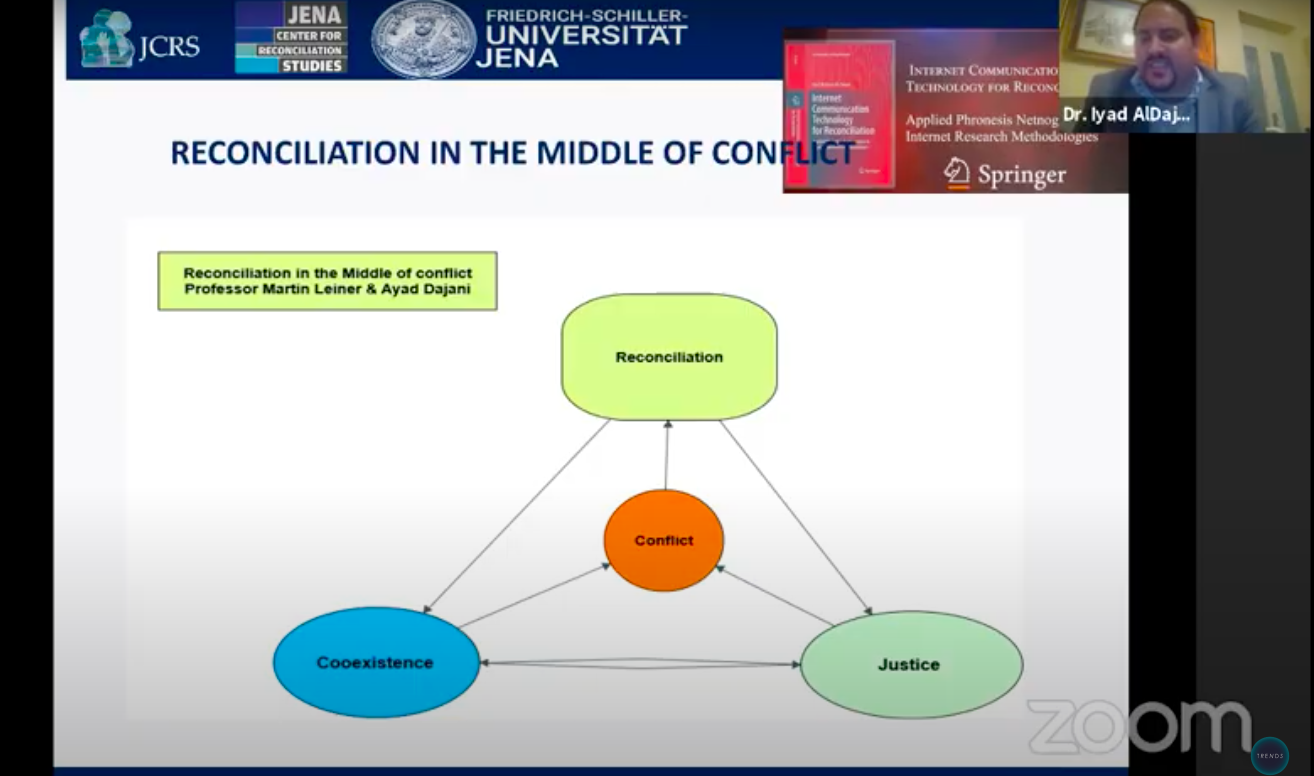
“Reconciliation will create justice and co-existence, which will tackle conflict in a way that it will go to reconciliation. This can develop a new reality for a better future for our children,” Al-Dajani said.
“Reconciliation will create justice and co-existence, which will tackle conflict in a way that it will go to reconciliation. This can develop a new reality for a better future for our children.”
Abdulla Al-Junaid, a Bahraini writer specialized in political affairs, praised the UAE on becoming the first Gulf Arab country to reach such a deal with the Jewish state, saying “I think the breakthrough that the #UAE has managed through the Peace Agreement is motivate everybody to reconcile with history.”
“The UAE represents something unique and different from the traditional Arab world because it’s stable, it’s growing, it’s economy is well-diversified and it’s well-represented worldwide,” Al-Junaid added.
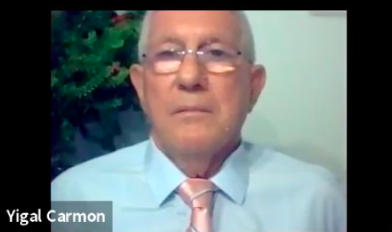
The President and Founder Middle East Media Research Institute Yigal Carmon called the accord “historic” and a breakthrough toward peace, saying that “Peace treaty initiated by Sheikh Mohamed bin Zayed Al-Nahyan is more important for the region than that of Egyptian president Anwar Sadat’s in 1979.”
“The hard and inspiring work of Crown Prince Mohamed Bin Zayed towards implementing this vision of peace deserves international recognition and qualifies him as a serious candidate for the Nobel Peace Prize. Unfortunately it has not received the attention and appreciation that it deserves,” Carmon added.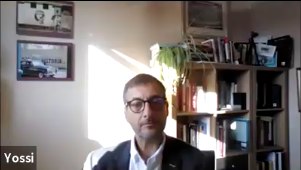
Reiterating the accord as a “historic” breakthrough toward peace, Professor Yossi Mekelberg a Senior Consulting Research Fellow of the MENA Program at Chatham House, and a Professor of International Relations at Regent’s University, London, emphasized how the agreement between the UAE, Bahrain and Israel has the potential to forge a broad new relationship and reshape the order of Middle East politics.
“The agreement between the UAE, Bahrain and Israel monumental and historic event because it can potentially, depending on what happens next, mark a new era in terms of peace and cooperation,” Mekelberg said.
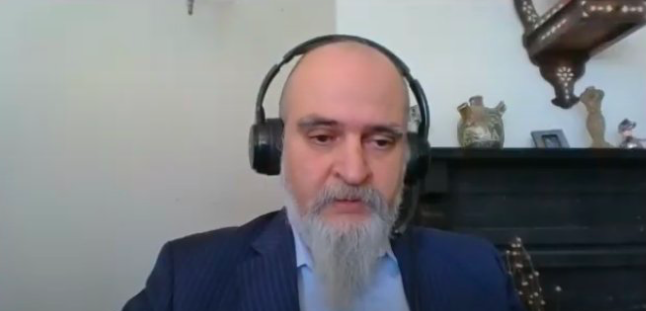
Discussing the new opportunities to settle the Palestinian issue, a non-resident fellow at the American Task Force on Palestine, Ghaith Al-Omari, explained that idea of leveraging the normalization of Arab-Israeli states to advance the Palestinian Israeli conflict, saying ““Those of us who look at the Israeli-Palestinian conflict have to think of how to leverage these developments into serving the particular conflict”
Placing the idea within the context of the current situation of Palestinian diplomacy, Al-Omari demonstrated why he thinks the Palestinian strategies and diplomacy has “hit a dead end,” referring to the Palestinian leadership as “isolated” and therefore unable to effectively solve the Palestinian-Israeli conflict.
“The traditional Arab and Palestinian approach to normalization has been all or nothing, which means once Israel ends all of its occupation of Arab states, then it can get all of the fruits of normalization,” Al Omari said.
“Two decades after the Arab peace initiative, clearly this absolutist approach has not worked. So the UAE has adopted a new approach, which has departed from the all or nothing to a much more gradual approach,” Al Omari added.
Henceforward, Al Omari said, the leverage these developments into serving the particular conflict”
Al Omari then elaborated on the idea of leveraging such developments into serving the particular conflict, whereby movement towards normalization is corresponded with concrete action on the Palestinian-Israeli track.
“I expect to see two kinds of normalization happening between Arab states and Israel. We will see ‘Big Normalization’ as we saw with the UAE and Bahrain, which are steps that will lead to peace treaties and ultimately exchange of diplomatic relations, and ‘Small Normalization’ that lead to smaller diplomatic moves,” Al Omari said.
For example, he said, in the case of big normalization, one can expect to see big diplomatic moves from Israel, whether these moves relate to issues of settlements, issues of reaffirming commitment of the two state-solution.
“We have a list of diplomatic issues that one can ask for in exchange or in parallel to Arab-Israeli big normalization and we should start seeing if we can start linking these kinds of normalization with concrete action on the Palestinian-Israeli track. It would also be helpful if can find a way to modify the Arab-peace initiative to create an institutionalized framework for these kinds of steps while maintaining the ultimate objective of seeking a solution of the Palestinian-Israeli conflict through a two-state solution,” Al Omari added.
The Editor-in-chief of the Israeli newspaper Yedioth Ahronoth, Neta Livne spoke about the role of the media in building a culture of peace and the central role it played in facilitating the peace agreement between the United Arab Emirates and Israel.
“It is journalism that connects our two nations, it is journalism that allowed me, the Editor-in-chief of an Israeli newspaper, to write an article addressed to the public in the UAE and engage them directly,” Livne said.
Livne then explained how an article written by the UAE Ambassador to the United States, Yousef Al Otaiba, which was published in the Yedioth Ahronoth newspaper had a significant impact in influence Israel to not proceed with the annexation plan and accelerated the decision to normalize relations two month later and sign the accord.
“The peace agreement provides us provides us a welcome and opportunity to publish good, encouraging and optimistic news. I am hopeful and looking forward to the very near future where you can come visit the holy city of Jerusalem, Tel Aviv, the dead sea and many other sites Israel has to offer and I equally look forward to vising the UAE,” Livne said.
UAE Author and International Affairs Analyst Omar Al Busaidy expanded the discussion by speaking about the UAE-Israel peace agreement and the Israeli window into the UAE as a model of success to the Arab world.
“What was evident more than anything was the positive reaction from the vast majority of citizens and residents in the UAE in time when fear and anxiety has gripped the people because of the COVID-19 pandemic. Today the UAE is measured not only by the traditional perimeters of progress and prosperity but the benefit of its growing soft power in the global community,” Al Busaidy said.
“In the UAE we see a push towards openness tolerance and co-existence. These two show pieces of tolerances, religious and social can’t help but position the UAE as a nation that is wielding its immense soft power for the good of all. The UAE has been a successful Arab model where it is the only country in the region where you have people from 150 countries that call it home. It is especially important when the mass media begin to promote a culture of peace instead of a culture of war. We need a new narrative, where this region was called ‘the near East to the Middle East’ now I think the appropriate description would be “the new East.” I am hopeful that with a bright vision, new approaches, bold decision and strong leadership global peace can be achieved as this is the will of the people,” Al Busaidy added.
In concluding the event, Dr. Geoffrey Kemp, a senior Director of Regional Security Programs at the Center for the National Interest in the US emphasized the befits of endorsing the concept of a ‘modern Middle East’ and pointed out that given the challenges that this region and the world faces (and will continue to face in the future) it is in everyone’s self-interest to work together closely, as this is the way to forge a new path towards prosperity.